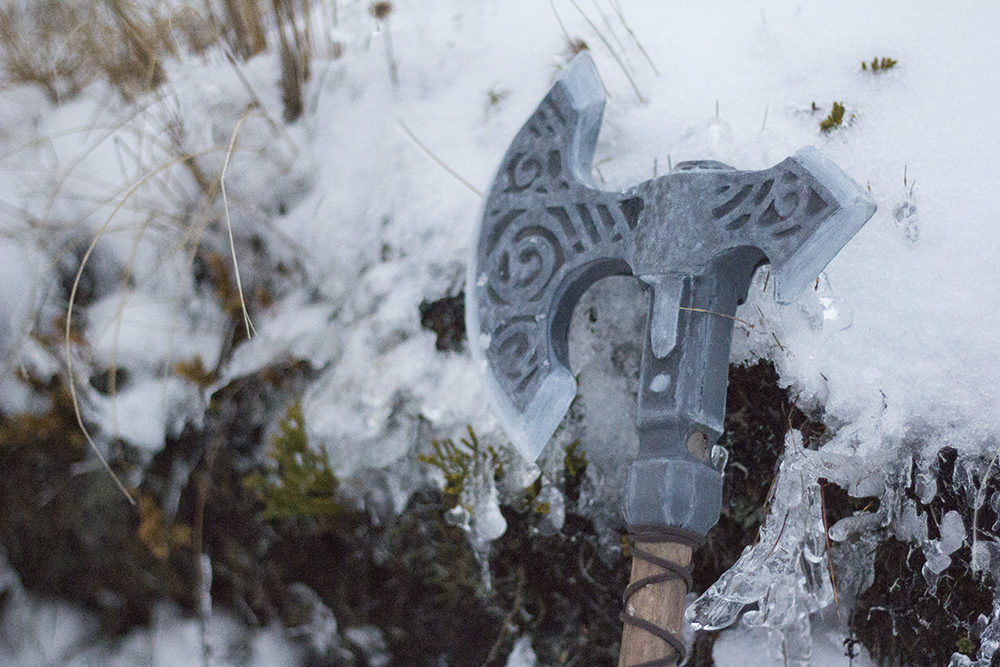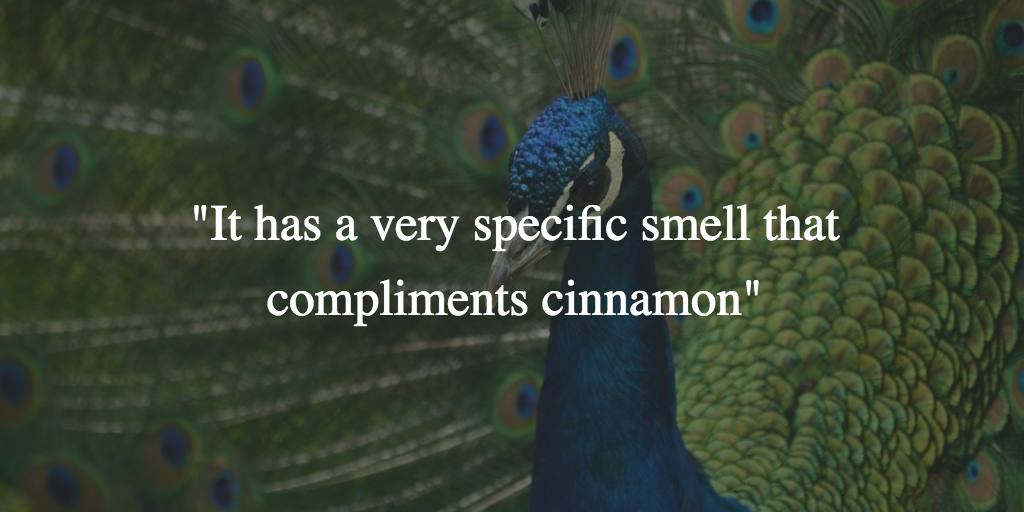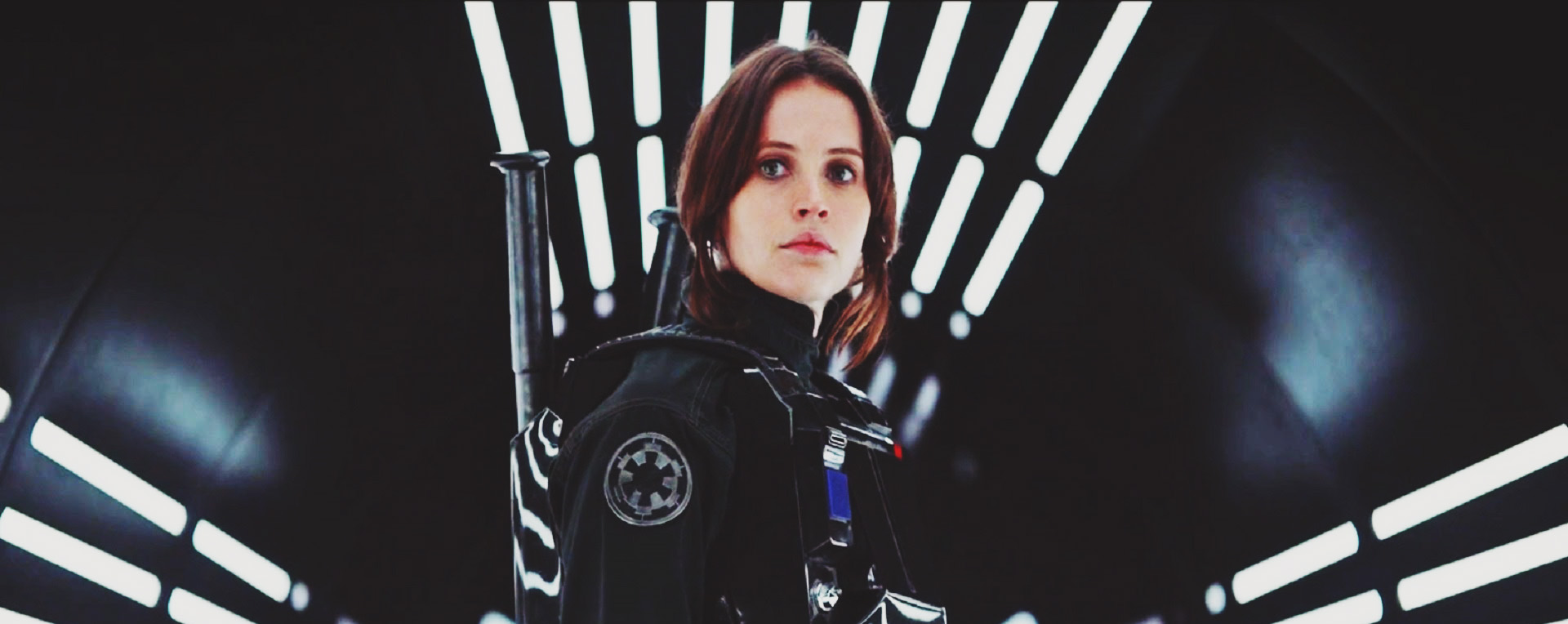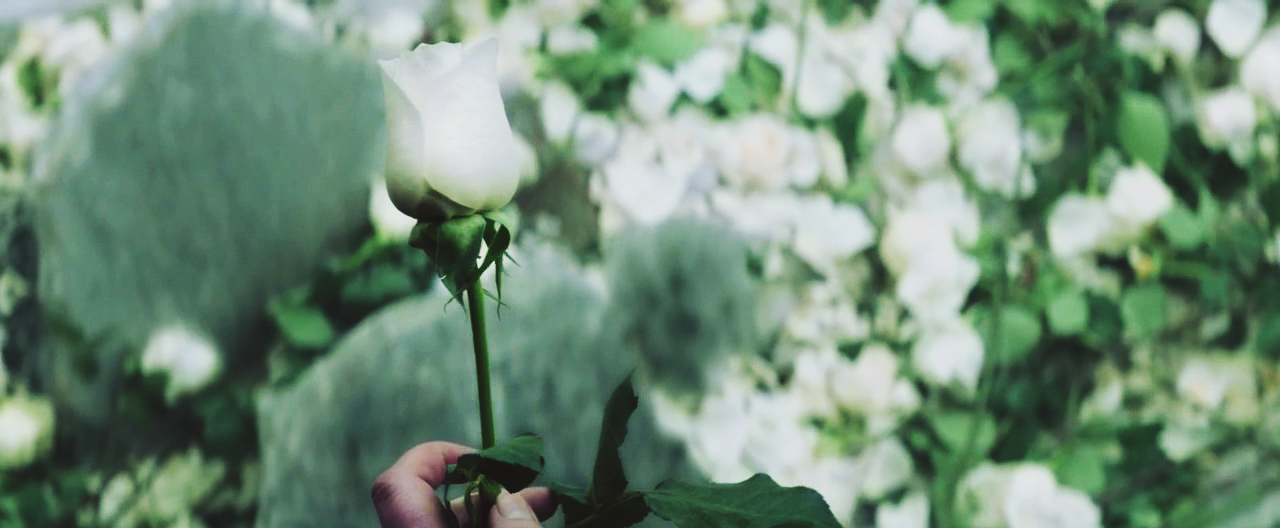
The Bird & the Snake
“Remember who the enemy is,” Haymitch tells Katniss, moments before she is taken off to the Quarter Quell arena. Again, he reminds her as she attempts to talk down a man in District 2 holding a gun to her head; “Who is the enemy?”
The enemy, she knows, is the Capitol, and the man who embodies the so-called “beating heart” of Panem: President Snow. Where she is the symbol of freedom, he is the symbol of an oppressive system.
When Katniss first meets the President at the presentation of the victors, she understands instantly that he knows she is a threat, that she is the reason the Games and the Capitol were undermined. In the film, he seems to come across softer, commenting on her mockingjay pin and telling her that her district must be proud.
This softness and civility, we know, is a ruse. His eyes, she notes in the novel, are “as unforgiving as a snake’s” as he crowns her. What Katniss doesn’t realize at the time is how alike the two are, and just how much they will come to understand each other.
From the moment Katniss volunteers for her sister at the reaping—a move unheard of in the districts, and especially in District 12—her capacity for endangering the system is likely very clear to President Snow. Though we can’t see his point of view within the novels, and rarely see it within the films, Katniss’ choice—which isn’t a choice for her—causes her to step into a rare role within the Games.
Her act highlights the unfairness of the reapings and the Games in a new way. Her district’s refusal to applaud her volunteering, instead saluting her with a farewell, is only the first rebellion her instinctual acts inspire. In the films, Snow watches her fiery arrival with great interest, and he later warns Seneca about falling for the underdog, by which he means Katniss. Snow sees the potential Katniss doesn’t yet understand.
In the Catching Fire novel, the two finally speak for the first time, and it is then that they come to an understanding that lasts throughout the rest of the series: they will not lie to each other. They agree to this when Snow comes to Katniss’ home to intimidate her into calming the districts, but he must be scared of this young woman himself to go all the way to 12 just to threaten her. As he clearly explains the state of the districts to Katniss, he rubs a spot on his forehead over his left eyebrow, and Katniss notes that she gets headaches in that exact place.
She and Snow are not so different, and it’s that understanding of the other that they both possess that keeps them so focused on each other during the rebellion. During his visit, Katniss is surprised by his sincerity of his speech, as he openly admits to the Capitol’s fragile existence. He speaks to her as if she’s on the same level as him, though clearly he has the power in the room.
Later on, when their roles are switched in the rose greenhouse, Snow speaks to Katniss openly and frankly once more. He has nothing to hide from this girl whose self-interest causes the death of many despite her best intentions. When she visits him, psychologically avox-mute, he sees the broken person she has become, but he also still sees the same girl on fire that so scared him after the 74th Hunger Games.
While their dynamic within the series is one of a manipulated, underprivileged young woman trying to fight back against the narrative an older, manipulative dictator has created to keep people like her under control, there’s more to it. Katniss also manipulates, Snow is also a survivor. The difference is where they come from and what they fight for: while Katniss wants freedom, Snow wants control. Katniss’ spontaneity defines her actions, whereas Snow calculates his moves down to his very words.
The films show this clearer than the novels in some ways, as the audience gets the chance to see Snow’s point of view at times. Before his speech condemning the actions of the Rebels, Snow refuses to call them by that title—rebel—saying he won’t legitimize them with the name. Instead, he and Egeria work together to find a term more appropriate for the narrative they want to create: radicals.
Unlike Snow, Katniss struggles to deliver a line she can tell has been worked on for months—”We fight, we dare, we end this hunger for justice.”—instead needing her words to come from real emotion. Perhaps that is the most defining difference between the two: Katniss’ emotions, and Snow’s apparent lack of them.
In Catching Fire, the first time we meet Snow’s granddaughter in the films, Snow notices that she has started wearing her hair in a side braid, and is obviously displeased upon learning that everyone at her school now follows Katniss’ fashion trend. Katniss, through her manipulation of the Games, forces her way into Snow’s home by becoming a hero to his own granddaughter. That is the danger she poses to him, the ability to sway his people’s hearts.
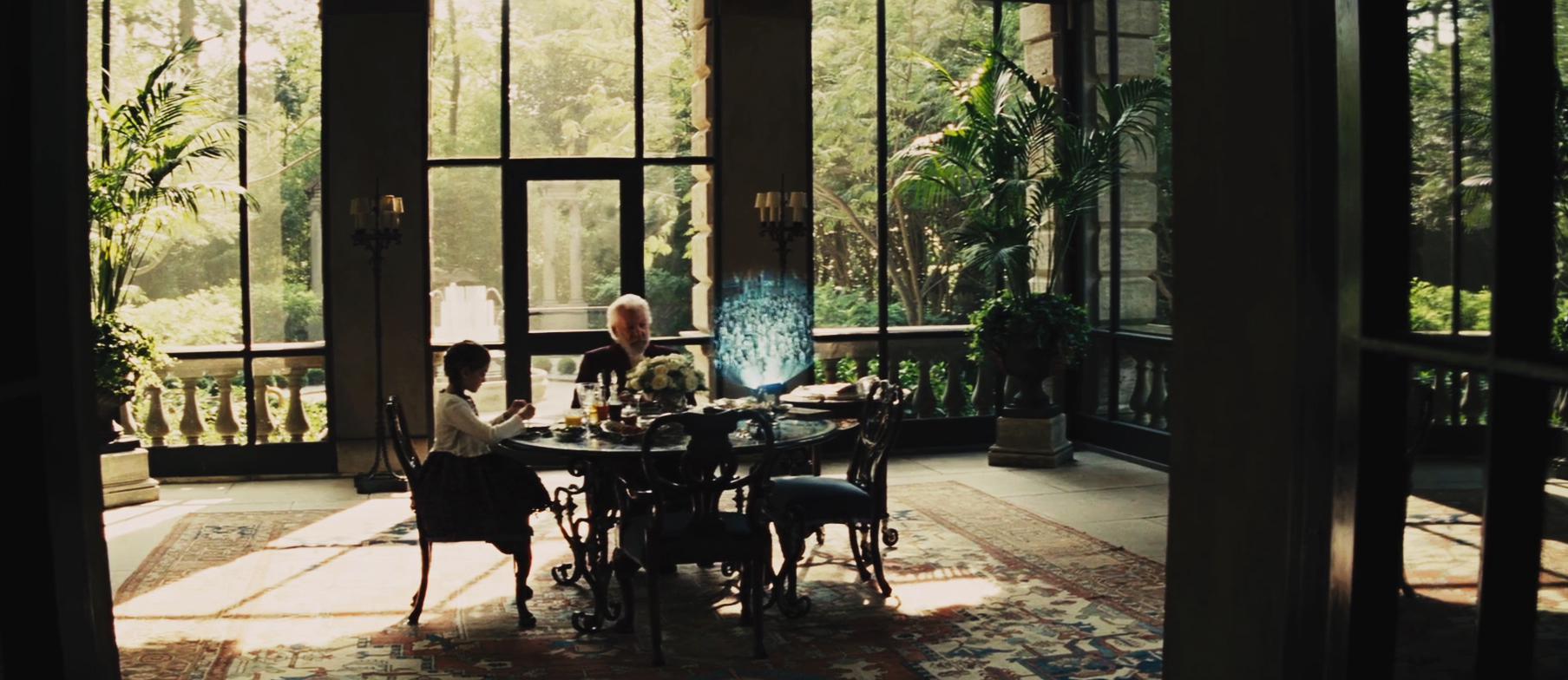
While delivering his speech about the “radicals” in Mockingjay, his granddaughter is present in his office. As he announces that all symbols of the Mockingjay will henceforth be considered treason with offenders executed, we see her begin to unbraid her hair. The fact that Snow’s own granddaughter moves so quickly to remove a symbol of the Mockingjay, that she fears her own death, says a lot about how even his family views him.
However, returning to the Catching Fire film, we can see genuine love from Snow towards his granddaughter. The way he looks at her when telling her that she will one day love someone as much as she believes Katniss loves Peeta isn’t so different from the way Katniss looks at Prim when telling her how beautiful she looks in the first film.
How much of Snow’s desire to keep Panem as is stems from wanting to guarantee a bright, safe future for his granddaughter? If he is anything like Katniss—and it seems he is—he may in part view his actions as justified for the sake of the young girl he cares for so much.
Katniss and Snow know the importance of keeping up an act for the sake of not showing weakness. Katniss, having grown up watching the Games, knows that crying when the cameras are on her after volunteering will single her out as weak both to the other tributes and to her sponsors. Snow, similarly, has his maxim, “Never let them see you bleed.”
Their reliance on the other’s public behaviour earlier in Catching Fire reflects this. If one of them shows fear or hatred of the other publicly, they will both be undermined, so they must perform as if close. Katniss may not be able to read prepared lines, but she is just as adept as Snow at keeping the crowd happy.
Even after a silent conversation between the two tells Katniss that she hasn’t convinced Snow of her love for Peeta, the two joke and laugh together onstage because they must. To the rest of Panem, they are best friends, while they both hold desperate hatred for the other.
“Oh, the fun we two have together,” Katniss thinks sarcastically at this time, because while she knows that while they’re both having quite the opposite of fun, they’re on the same page. There’s an odd familiarity between the two, born of mutual fear, hate, and the reliance on the other for survival.
But when Snow announces the Quarter Quell and the victors-turned-tributes begin to fight back with their words, this agreement between the two disappears. Katniss’ Mockingjay gown signals her open rebellion against what Snow has done to her and the people she loves, and she knows the significance of the dress and her transformation is not lost on him.
Much of the trilogy has analogies to animals and the natural world, largely because of Katniss’ attunement with nature. Katniss herself is seen as a bird, a mockingjay that, by its very existence, rebels against the Capitol. Snow, on the other hand, is compared to a snake by Katniss, an animal often linked to poison, or medicine, and vengefulness. In the same way that snakes and birds are both predator and prey to the other, Katniss and Snow constantly find themselves trying to destroy each other.
Snow being a snake is obvious, not just in personality, but in his use of poison to remove his adversaries and maintain his authority. However, snakes are also symbolic of medicine, as mentioned earlier. While Katniss’ mother and sister are both healers, Katniss is known for her inability to handle illness or serious wounds. She has basic knowledge of the craft, but her hands are far more suited to killing.
Snow contrasts against Katniss’ family with his use of poison, but not so much against the hunter, Katniss, herself. Nearing the end of Mockingjay, Katniss murders without a second thought to achieve her goal of killing President Snow. In her mind, she is justified in her actions—but the loved ones of the woman she kills in the Capitol might not agree.
At the war’s end, when Katniss stumbles upon Snow’s prison, she finds him to be the only person she can trust to learn the truth from. Haymitch is drunk and unreachable, Peeta is still struggling with his hijacked mind, Boggs and Cinna are dead, and Gale may well be responsible. In the end, Snow’s agreement with Katniss to always be honest is the only thing she can rely on. She knows him, understands him. As always, he is open with her, explaining how Coin played both of them while they were so focused on the other.
After weeks of being unable to talk, of struggling with nightmares and confusion, Katniss gains the clarity she needs to find her words again from Snow. What he says to her isn’t a plea for his own life—he knows he’ll die either way—and isn’t an attempt to hurt Katniss further, because he’s not lying. Why does he help her? Perhaps it’s the knowledge Katniss is no longer his enemy, that they’ve both been hurt by Coin. Perhaps he sees himself in her.
Both driven to survive above all else, the two are seen to make selfish decisions throughout the series. Katniss’ refusal to be the Mockingjay when she figures out how Snow is using Peeta against her, Snow’s admission that if he’d had a hovercraft at the end of the war he’d have used it to run away rather than bomb children. Though they both step into leadership roles, they’re both willing to abandon the people that look up to them when their livelihood is seriously threatened.
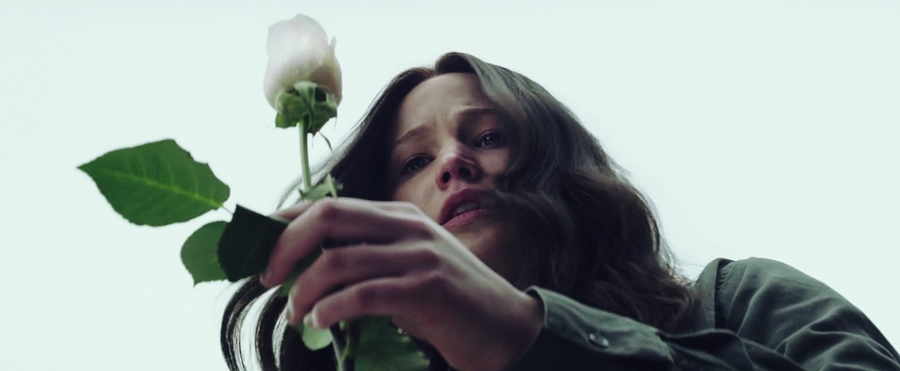
Despite the disparity in power, the two are equal in mind and in will. The way Katniss goes from fear of the man to a desire to kill him so strong she’s willing to risk the pod-strewn Capitol just for the chance is interesting to watch, and the dynamic introduced with the understanding that the two are quite alike makes their conflict even more fascinating. In much the same way that Katniss is more like her father than her mother, she is also more like Snow than Coin.
There’s no doubt that President Snow is not a good man, but Katniss is not always a pure-hearted heroine. It’s the fact that Katniss is selfish and manipulative, and still fights for the good of others that makes her so compelling. It’s the knowledge that Snow has the power to change Panem for the better, but instead clings to his crumbling vision that makes him so hateful.
The Hunger Games is about far more than good versus evil, and recognizing the similarities between Katniss and Snow brings another level to both the novels and the films. The series understands that on either side, there are those with good intentions, and there are those with bad, and sometimes they both deal with headaches in the exact same place.
Like my words? You can support me on Patreon!

